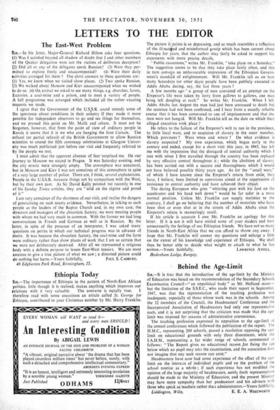Behind the Age-Limit
sm,—It is true that the introduction of the age-limit by the Ministry of Education was based on the recommendation of the Secondary Schools Examination Council—" an unpolitical body " as Mr. Holland states— but the limitation of the S.S.E.C., who made their report in .September, 1947, was that the representation of the teaching profession 'was inadequate, especially of those whose work was in the schools. Among the 32 members of the Council, the Headmasters' Conference and the Incorporated Association of Headmasters had only one representative each, and it it not surprising that the criticism was made that the age- limit was imposed for reasons of administrative convenience. The teaching profession expressed its opposition to the age limit at the annual conferences which followed the publication of the report. The H.M.C., representing 200 schools, passed a resolution opposing the age- limit on educational grounds with only three dissentients, while the I.A.H.M., representing a far wider range of schools, commented as follows: "The Report gives no educational reason for fixing the age below which no pupil may take the examination,-and the association does not imagine that any such reason 'can exist" Headmasters have now had some experience of the effect of the age- limit on the interests of individual pupils and on the problem of the school routine as a whole ; if such experience has not modified the opinion of the large majority of headmasters, surely fresh representations should be made to the Ministry of Education, and the present Minister may have more sympathy than her predecessor and his advisers with those who speak as teachers rather than administrators.—Yours faithfully,


































 Previous page
Previous page